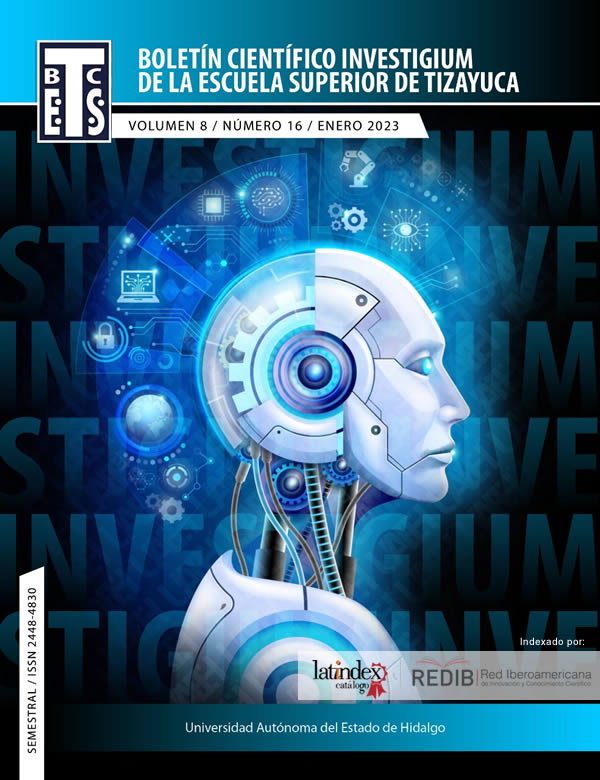Labor inequities in the pandemic: some considerations to reflect on dignity and exclusion in food delivery people in the city of Pachuca de Soto, Hidalgo
Abstract
In the framework of the Covid-19 health crisis, the contemporary Administration needs to carefully examine the scope of its most important theoretical and conceptual contents. To do this, recovering concepts from the Social Sciences allows balancing its relevance as a discipline. Uncertainty, as a contingent variable of organizational analysis, highlighted with the connection of the context to identify the gap between theory and daily manifestations of work. Vulnerability worsened, through the development of operational activities at work, by making visible different elements that were hidden, which when manifested result in a model of precariousness characterized by exclusion. The thread that weaves these narratives is found in the collective imagination. That houses a complex framework of meanings that reproduce inequalities. This presentation reflects on two central concepts: dignity and exclusion. The work is divided into two sections. The first discusses how people's dignity is strained when there is a high level of job uncertainty. The meaning of the concept of dignity in and for work in the pandemic is outlined. Subsequently, the concept of exclusion is exposed, which crosses the perception of the effort to carry out a task and denotes it in the current context and as a consequence of the neoliberal financial crisis, which has led thousands of people to lose a job and live in a state of socioeconomic precariousness. The work focuses on food delivery workers in the city of Pachuca de Soto, Hidalgo.
Downloads
References
[2] Allen, D., y May, C. (2017). Organizing Practice and Practicing
Organization: An Outline of Translational Mobilization Theory. SAGE Open. https://doi.org/10.1177/2158244017707993
[3] Annink, A. (2016). From social support to capabilities for the work–life balance of independent professionals. Journal of Management & Organization, 23(02), pp. 258–276. https://doi.org/10.1017/jmo.2016.53
[4] Arancibia, F. (2011). Flexibilidad Laboral: Elementos teóricos-conceptuales para su análisis, Revista de Ciencias Sociales, 26, 39-55.
[5] Beirne M. y F. Wilson (2016), Running with wolves or waiting for a happy release? Evaluating routes to gender equality, Work Employment & Society, 30 (2), 220-236.
[6] Castilla, Emilio (2010). Mérito y discriminación dentro de las organizaciones: diferencias en la evaluación y retribución de empleados/as según género y origen étnico, Revista Española de Investigaciones Sociológicas, 129, 61-105.
[7] Clegg S., Kornberger M. y Pitsis T. (2016), Managing and organizations: an introduction to theory and practice, Sage Publications,1- 17.
[8] Comas-Herrera, A., Fernandez, J. L., Hancock, R., Hatton, C., Knapp, K., McDaid, D., Malley, J., Wistow, G., Wittenberg, R. (2020). COVID-19: Implications for the Support of People with Social Care Needs in England. Journal of Aging & Social Policy, 32(4–5), 365–372. https://doi.org/10.1080/08959420.2020.1759759.
[9] De La Garza, E. y Neffa J. (2010). “Modelos económicos, modelo productivo y estrategias de ganancia: conceptos y problematización”. En De la Garza, E. y Neffa J. (coordinadores). Trabajo y modelos productivos en América Latina: Argentina, Brasil, Colombia, México, y Venezuela luego de las crisis del modo de Desarrollo neoliberal, 15-47.
[10] Forbes. (2020, Abril 12). La pandemia puede provocar la recesión más profunda de la existencia, Recuperado de http://forbes.com/economía-comercio-coronavirus-omc-recisión-histórica/
[11] García, A. (2018, Diciembre 17). 6 de cada 10 trabajadores son informales y generan El 22.7% del PIB de México. El Economista.
[12] Gómez, A. (2008). La diáspora colombiana: trabajos preciosos y trabajadores despreciados. Ensayos de Economía, 18 (33), 15-45. https://revistas.unal.edu.co/index.php/ede/article/view/20854
[13] Habermas, J. (1993). El discurso filosófico de la modernidad. Madrid: Taurus.
[14] INEGI. (2020, Abril 29). Estadísticas a propósito del día del trabajo. Datos nacionales. https://www.inegi.org.mx/contenidos/saladeprensa/aproposito/2020/trabajoNal.pdf
[15] Langlois, J., Kalakanis, L., Rubenstein, A., Larson, A., Hallam, M., y Smoot, M. (2000). Maxims or myths of beauty? A meta-analytic and theoretical review. Psychological Bulletin, 126(3), 390–423. https://doi.org/10.1037/0033-2909.126.3.390
[16] Machado, M., y Teixeira L. (2017). Dignity in the Context of Organizations: A Look beyond Modernity. Revista de Administração Mackenzie, 18(2), 80–103. https://doi.org/10.1590/1678-69712016/administracao.v18n2p80-103
[17] Martínez, Marroquín y Ríos (2018). Precariedad laboral y pobreza en México, Análisis Económico, 86, 113-131.
[18] Maurizio, R. (2021, Septiembre). Empleo e informalidad en América Latina y el Caribe: Una recuperación insuficiente y desigual. Organización Internacional del Trabajo. https://www.ilo.org/wcmsp5/groups/public/---americas/---ro-lima/documents/publication/wcms_819022.pdf
[19] Mea W. y Sims, R. (2019). Human dignity-centered business ethics: A conceptual framework for business leaders. Journal of Business Ethics, 160(1), 53-69. https://doi.org/10.1007/s10551-018-3929-8
[20] Mendizábal & Jiménez (2012). Análisis de la dignidad del trabajador en el contexto de la globalización, Revista Chilena de Derecho del Trabajo y de la Seguridad Social, 6, 165-194.
[21] Mejía, C. (2018). La importancia del trabajo en Marx y las transformaciones en la época de precariedad laboral. En Ibarra Reyes, Rubén., Arizmendi, Luis., Ibarra Escobedo Rubén y Hernández Suárez, José Luis. La obra perdurable de Marx a 200 años de su natalicio. Zacatecas (México): Universidad Autónoma de Zacatecas/TabernaLibraria.
[22] Organización Internacional del Trabajo. (2018). Mujeres y hombres en la economía informal: un panorama estadístico, 3ª Edición. Organización Internacional del Trabajo https://www.ilo.org/wcmsp5/groups/public/---dgreports/---dcomm/documents/publication/wcms_635149.pdf
[23] Payton, E. y Echeverria S. (2020). Incorporating Health Equity and Community Perspectives During COVID-19: Commonalities with Cardiovascular Health Equity Research. Ethnicity & Disease. 30 (3). 421-424 https://doi.org/10.18865/ed.30.3.421
[24] Pirson, M. (2019). Humanistic Perspective for Management Theory: Protecting Dignity and Promoting Well-Being. Journal of Business Ethics. 159, 39–57. https://doi.org/10.1007/s10551-017-3755-4
[25] Stacey, C. (2005). Finding dignity in dirty work: the constraints and rewards of low‐wage home care labour. Sociology of Healt & Illness. 27 (6), 831-854. https://doi.org/10.1111/j.1467-9566.2005.00476.x
[26] Vejar, J. (2014), La precariedad laboral, modernidad y modernización capitalista: una contribución al debate desde América Latina, Trabajo y Sociedad, 23, 147-168.
[27] Väyrynen, T. y Laari-Salmela, S. (2018). Men, mammals, or machines? De humanization embedded in organizational practices. Journal of BusinessEthics, 147(1), 95-113. https://doi.org/10.1007/s10551-015-2947-z
[28] Walter, T. (2013). Organizations and death – a view from death studies. Culture and Organization, 20(1), 68–76. https://doi.org/10.1080/14759551.2013.866731
[29] Weber, M. (2004), Economía y sociedad, 15ª reimp, FCE, 170.241.
Copyright (c) 2023 Angel Wilhelm Vázquez García, Francisco Omar Peña Guajardo

This work is licensed under a Creative Commons Attribution-NonCommercial-NoDerivatives 4.0 International License.











